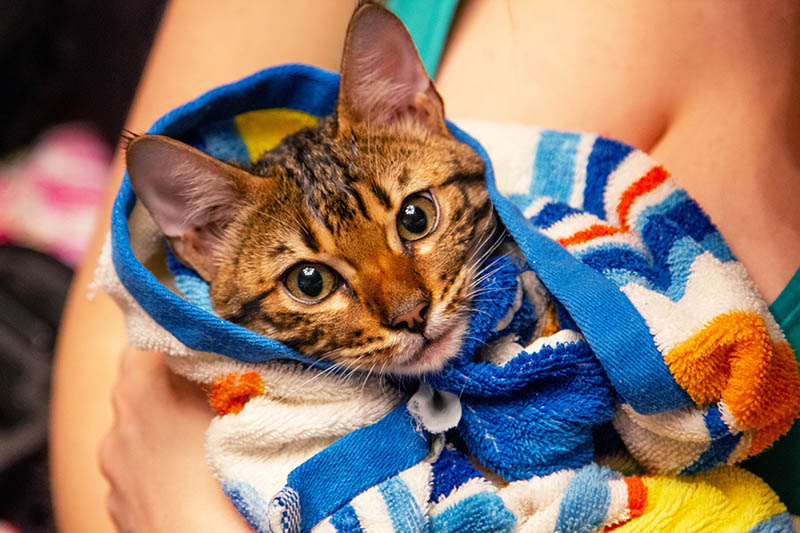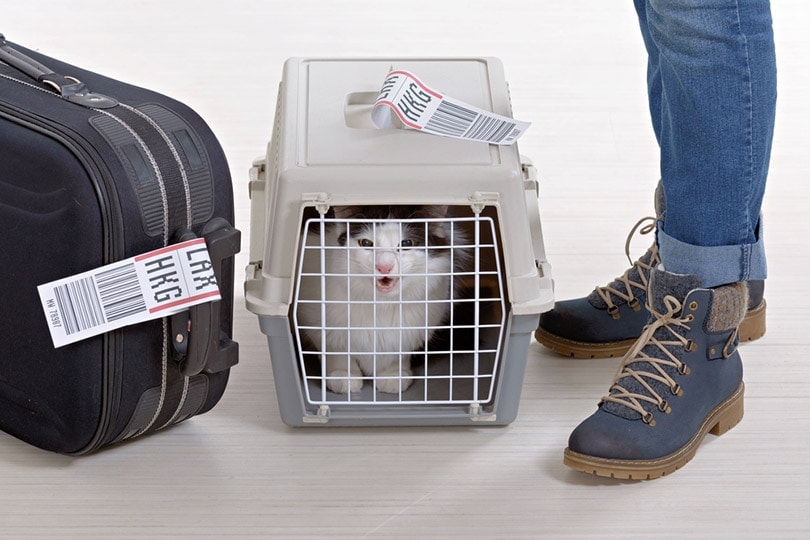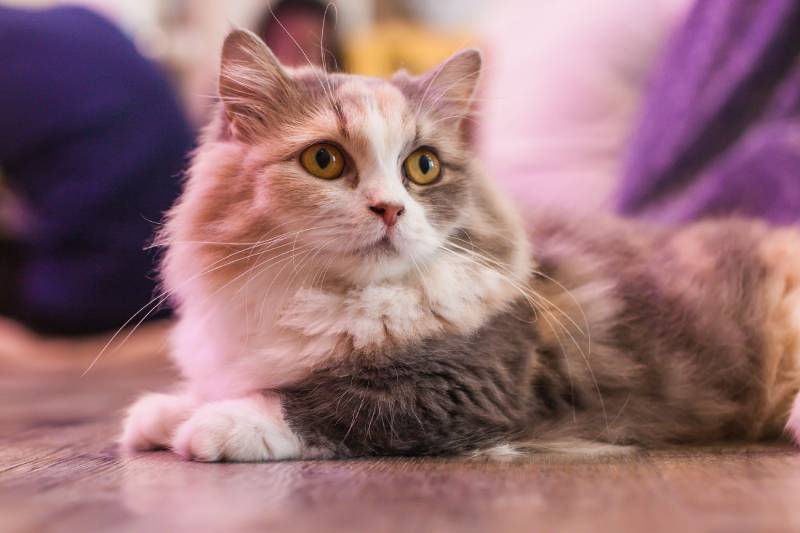Can Cats Eat Chicken? Vet-Approved Nutrition Facts & FAQ
By Grant Piper
Updated on

Many cat foods contain chicken. In fact, pet stores have shelves, even rows, of cat food that are absolutely filled with chicken. That means that cats can eat chicken, right? The answer is yes, cats can eat chicken. But just because cats hunt birds in the wild and eat wet chicken from a can doesn’t mean that chicken is 100% safe for your cat. Before you decide to feed chicken to your cat, there are some things you need to know, including the potential risks and things to avoid. This guide will cover how best to feed chicken to your cat, the nutrition facts for plain chicken, and some important FAQs that you need to know the answer to.
Chicken Nutrition Facts
- Calories: 284
- Protein: 53.4 g
- Fat: 6.2 g
- Sodium: 44mg
- Carbohydrates: 0g
- Fiber: 0g
- Sugars: 0g
Can Cats Eat Chicken?
Cats are carnivores, which means that they primarily eat meat in the wild. However, this doesn’t mean you’ll find them chowing down a chicken breast. Cats do not need to eat large amounts of chicken, especially if they’re already getting plenty of it in their regular food. Additionally, any chicken you offer your cat should be cooked.
If you were to feed your cat a diet of only chicken, they would end up with nutritional deficiencies. Why? Because although chicken is high in protein, it lacks many of the minerals, vitamins, and amino acids essential for feline health, most notably taurine. Cats in the wild will hunt and eat birds, mice, insects, reptiles, and they will consume many parts of what they catch. This includes muscle, bone, cartilage, fat, skin and organs. So while chicken meat alone will not provide everything they need, it is certainly a suitable treat for our feline friends.
The only exceptions to cats eating chicken are if the cat has a chicken allergy. Although not overly common in cats, chicken allergies or intolerances do occur, and can result in itchy and inflamed skin, or gastrointestinal distress. If you think your cat might have a chicken allergy, talk to your vet.
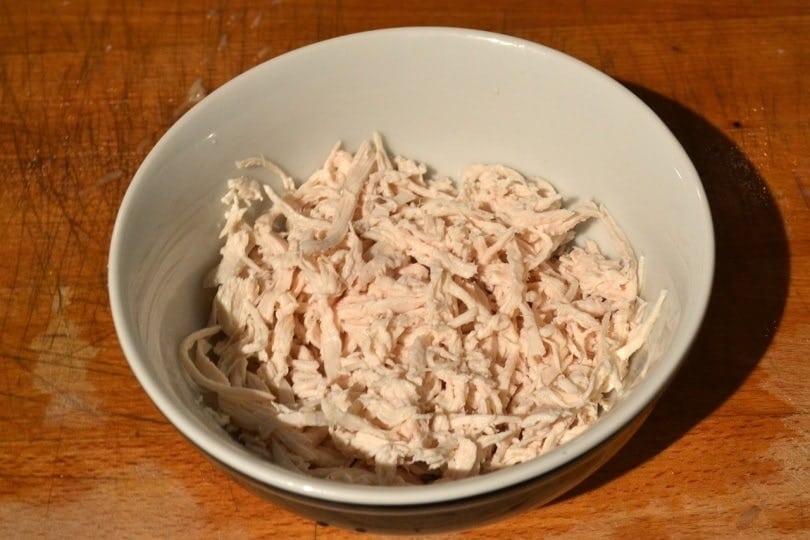
Chicken to Avoid With Cats
Despite the fact that chicken is largely safe for cats, there are still multiple types of chicken that you need to avoid. You do not want to feed your cat any chicken that has been heavily spiced, marinated, or fried. The best type of chicken for cats is plain cooked chicken. You should also avoid feeding your cat unhealthy options like chicken nuggets, or canned chicken. Many of these foods are formulated for humans, and they are not made for feline consumption.
- Spiced
- Marinated
- Fried
- Chicken nuggets
- Frozen
- Canned
Can Cats Eat Raw Chicken?
Technically, yes. Cats can eat raw chicken, and offering them the occasional raw chicken neck can be beneficial to their dental health. BUT, feeding any raw meat, particularly chicken, comes with the risk of spreading pathogens. Bacteria such as Salmonella and Campylobacter are common contaminants of raw chicken that can infect not just cats, but humans too.
If you want to offer your cats any raw meat, here are a few ways you can reduce the risks to them, yourself, and your family.
- Freeze any meat you intend to serve for approximately 2-3 weeks, or buy frozen meat from a reputable pet store. Thaw only the amount you are using – do not refreeze. Thaw meat in the refrigerator.
- Use gloves when handling raw meat, or be sure to wash your hands thoroughly with antibacterial soap before and after handling.
- Make sure any knives, cutting boards, and other items are cleaned with very hot water.
- Throw away any uneaten meat after 1-2 hours, again, wearing gloves or washing hands thoroughly.
- Do not feed raw meat to immunocompromised cats, and check with your vet before introducing raw meat into your cat’s diet.
- If in doubt, don’t; stick to plain boiled chicken as the safest option.
Can Cats Get Food Poisoning from Raw Chicken?
Yes. As we discussed earlier, despite the fact that cats eat raw meat in the wild, they can still get food poisoning from raw chicken, similar to humans.
Common signs of food poisoning in cats include fever, lethargy, poor appetite, diarrhea, vomiting, blood or mucus in stool, and enlarged lymph nodes. If your cat shows any of these signs, you should contact your vet, and don’t forget to mention any raw meats they have eaten, as this may be crucial for swift diagnosis and treatment.
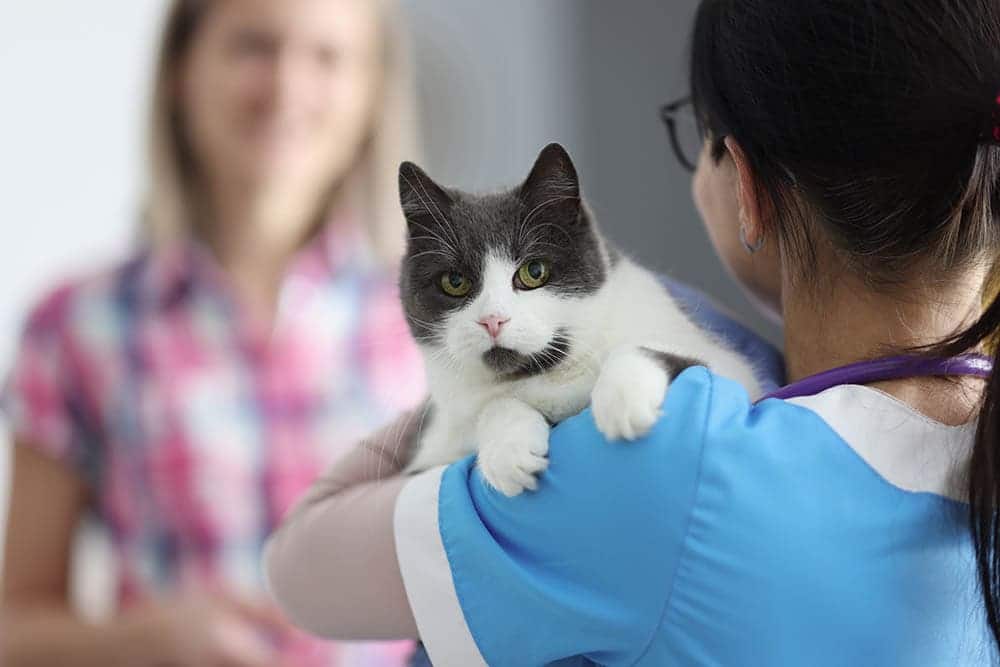
Can Cats Eat Chicken Bones?
No. Cats should not eat chicken bones. Cooked chicken bones are light and fragile, which makes them prone to cracking, breaking, or splintering. If a chicken bone cracks and splinters inside of your cat, it can lead to damage or tears in the esophagus, stomach, or intestines, which can lead to painful infections. Bones can also cause choking or an obstruction in the digestive tract.
We mentioned earlier about offering chicken necks to cats; when obtained from the butcher or pet store, the necks only consist of the trachea, which is made up of rings of cartilage, which pose a low risk of damage or obstruction to your cat. NEVER allow your cat to eat cooked chicken bones.
What Happens If Your Cat Eats a Chicken Bone?
If the chicken bones are raw and small, they will likely pass through with minimal problems. However, if your cat has managed to swallow a larger piece, they could be at risk of an obstruction. Raw bones don’t tend to cause damage to the lining of the gut, but if your cat has eaten cooked chicken bones, the risk that those bones could break into sharp fragments increases.
If your cat has eaten a large amount of bones, cooked or raw, you should contact your vet. They can advise you more specifically on the best course of action, which may be just to monitor your cat closely, or bring them in to be examined.
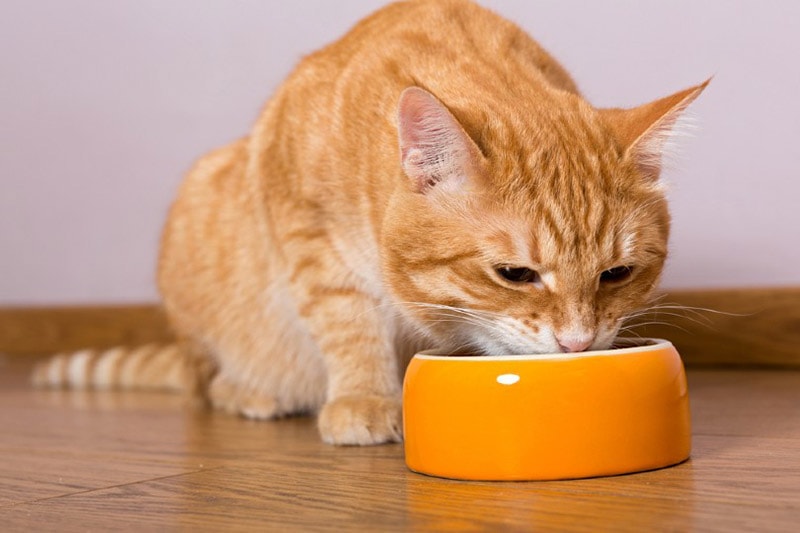
How Best to Feed Your Cat Chicken
- Start with plain chicken breasts, that way you have no bones or skin to worry about.
- Boil the chicken until it is cooked all the way through.
- Do not season, spice, marinate, or fry your chicken.
- Remove the chicken from the pot and chop into small pieces or cubes, and allow to cool thoroughly.
- Feed the chicken to your cat in small quantities as a treat or snack; 2-3 pieces a few times a week should suffice.
- Do not feed your cat exclusively chicken. Only feed chicken in conjunction with a high quality, nutritionally balanced diet.
Conclusion
Cats love chicken, and for the most part, chicken is safe for cats. The important message is to only include chicken as part of a balanced diet to ensure they are getting all the nutrients they need. Keep your kitty away from bones, particularly if they are cooked, and take care when handling raw chicken. Plain boiled chicken is a healthy and tasty snack that your cat will go wild for, but if you have any questions or doubts about whether it is suitable for your pet, don’t hesitate to talk to your vet.


